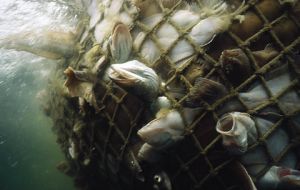MercoPress. South Atlantic News Agency
Fisheries, aquaculture support livelihoods of 8% of world population, says FAO
 About 32% of world fish stocks are estimated to be over-exploited or depleted
About 32% of world fish stocks are estimated to be over-exploited or depleted The contribution of fish to global diets has reached a record of about 17 kg per person on average, supplying over three billion people with at least 15% of their average animal protein intake.
This increase is due mainly to the ever-growing production of aquaculture which is set to overtake capture fisheries as a source of food fish, according to the State of the World's Fisheries and Aquaculture, released Monday. The report also stressed that the status of global fish stocks has not improved.
Overall, fisheries and aquaculture support the livelihoods of an estimated 540 million people, or 8% of the world population. People have never eaten as much fish and more people than ever are employed in or depend on the sector.
Fish products continue to be the most-traded of food commodities, worth a record 102 billion US dollars in 2008, up 9% from 2007.
The overall percentage of overexploited, depleted or recovering fish stocks in the world's oceans has not dropped and is estimated to be slightly higher than in 2006. About 32% of world fish stocks are estimated to be over-exploited, depleted or recovering and need to be urgently rebuilt, the report says.
On the other end of the scale, 15% of the stock groups monitored by FAO were estimated to be underexploited (3%) or moderately exploited (12%) and therefore able to produce more than their current catches.
“That there has been no improvement in the status of stocks is a matter of great concern,” said senior FAO fisheries expert Richard Grainger, one of the report's editors. “The percentage of overexploitation needs to go down although at least we seem to be reaching a plateau.”
The report also examines the growing legal efforts to enforce tighter controls on the fisheries sector, for example, through trade measures and against illegal, unreported and unregulated fishing.
The trade measures are meant to block entry of such fish and fish products from international trade in an effort to better manage the entire fisheries sector and reduce levels of overexploitation. A recent study estimates the cost of illegal and unreported fishing alone at 10 to 23.5 billion USD per year.
The report also notes increasing debate about a proposed global record of fishing vessels, which ideally would assign a unique vessel identifier to each vessel that would remain constant regardless of ownership or flag changes over time. Such transparency would make it easier to police vessels engaged in illegal fishing activities.
The increasing demand for fish highlights the need for the sustainable management of aquatic resources. The report recommends an ecosystem approach to fisheries, which is an integrated approach for balancing societal objectives with the state of the fishery and its natural and human environment.
Total world production of fish and fish products rose from 140 million tonnes in 2007 to 145 million tonnes in 2009, according to the FAO report. Much of the fish now comes from aquaculture, which is growing at the rate of almost 7% a year.
The report held up aquaculture policies in Southeast Asia — where fish is a fundamental part of people's diets — as a good example of balanced management. The report praised continuously improving government interventions built on comparative advantages and economic incentives that lead to growth, food security and better living standards.
The report contains a special chapter on inland fisheries. Inland fisheries are often overlooked by policymakers and irrigation and hydroelectric schemes are at times planned without regard for the impact on inland fishers' livelihoods. However, inland fisheries support 61 million people worldwide.
“Fish is a good quality and high protein food and the sector contributes in an important way to world food security,” said Grainger.




Top Comments
Disclaimer & comment rules-

-

Read all commentsIf they can farm salmon in scotland, and other places, cannot they farm-
Jan 31st, 2011 - 09:34 pm 0other fish in shore to help the sea stock recover, just an idea
“About 32% of world fish stocks are estimated to be over-exploited, depleted or recovering and need to be urgently rebuilt, the report says.”
Feb 01st, 2011 - 08:20 pm 0Absolutely meaningless terminology.
A fish stock is not a unit commodity - if it were, the North Atlantic cod might be worth a notional '200 stocks' compared to the Roughie of Argentinian waters.
When we say “ the North Atlantic cod is depleted to the point of extinction” it means much more in terms of human survival than the erradication of the Roughie or the Snow Crab.
Yes, it's good that communities farm shrimp and salmon - the elephant in this room is that every farmed individual needs ten times its own weight in food to be found for it and, for slow growing species, much more - where does this huge tonnage of fish-food come from?....that's right, the sea.
The switch from wild fisheries to farmed fisheries looks good if you just look at tonnages - but multiply the farmed tonnage by ten, add it to the farmed tonnage, add this to the wild fisheries tonnage, and you see the massive effect on the aquatic ecosystem.
We collect the 'easy' species as fish food (pellets) - sprats, mackerel, herring, pilchard, etc. Once these have gone the fish farming industry will revert to a cottage industry once more and Japan (especially) will yearn it's passing.
Commenting for this story is now closed.
If you have a Facebook account, become a fan and comment on our Facebook Page!